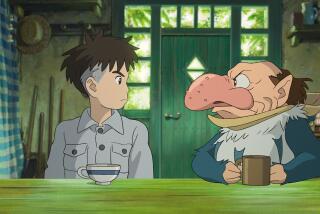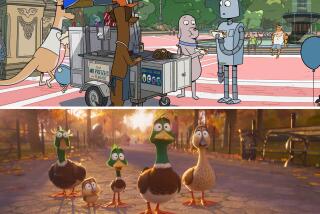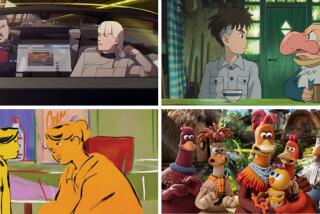‘Coraline’s’ thrilling 3-D world
The third dimension comes of age with “Coraline.” The first contemporary film in which the 3-D experience feels intrinsic to the story instead of a Godforsaken gimmick, “Coraline” is a remarkable feat of imagination, a magical tale with a genuinely sinister edge.
The story of an 11-year-old girl’s adventures in an alternate universe, “Coraline” comes by its disturbing qualities honestly, through the efforts of writer-director Henry Selick and novelist Neil Gaiman. It may be rated PG, but it is more suitable for adults than the very small among us.
Gaiman, one of the premier dark fantasists of his generation, wrote the original novel, which has been translated into 30 languages and sold a million copies worldwide. As for Selick, his past as the director of the deliciously creepy “The Nightmare Before Christmas” tells you everything you need to know.
If you’ve seen “Nightmare,” you know that Selick is the preeminent practitioner of stop-motion animation, which makes “Coraline” the first 3-D film to be made in that painstaking, labor-intensive process that involves the frame-by-frame manipulation of three-dimensional models. Stop-motion and 3-D may seem like strange bedfellows, but in fact they complement each other beautifully.
That’s because while stop-motion creates a fantastical imaginary world, the addition of the third dimension makes it so unblinkingly real we feel we could walk around in it. The third dimension is how the universe rattling around in Selick’s head gains authenticity on-screen, and to watch it unfold that way makes the theatrical experience feel special in a way it often hasn’t in years.
Coraline Jones, the film’s feisty heroine (expertly voiced by Dakota Fanning), is introduced with a crisis on her hands. She and her unnamed parents (Teri Hatcher and John Hodgman) have moved from Michigan to dark and rainy Ashland, Ore., taking up rooms in a large Victorian called the Pink Palace, where Coraline is bored, bored, bored.
That’s in large part because her parents are oblivious to her existence and given to saying things like “I’m really, really busy” whenever she tries to get their attention. Even the appearance of a local boy named Wybie (Robert Bailey Jr.) doesn’t help.
So Coraline is more than delighted when she discovers a hidden door in the house that opens onto a rabbit hole that leads down to a parallel world. There she meets her Other Mother and her Other Father, the attentive, devoted parents she’s always wanted. They look and sound like her real parents, with one unsettling exception: Their active eyes have been replaced by large black buttons.
Everything in this other world is livelier and more exotic than the one upstairs. Even Coraline’s neighbors, the furtive acrobat known as the Amazing Bobinsky (Ian McShane) and the retired actresses called Miss Spink and Miss Forcible (the British comedy team of Jennifer Saunders and Dawn French) are much wilder and crazier down here than in the real world.
It’s in this thrilling other world that the combination of stop-motion and 3-D really comes into its own. A jumping mouse circus has 61 mice on-screen (and took 66 days to animate), and an entire audience of Scottie dogs, 248 strong, watches a theatrical performance. It’s impossible not to be impressed.
The more wonderful this world becomes, the more the Other Mother pressures Coraline to stay forever, to trade in her eyes for buttons. It becomes harder and harder for the girl to return to her real home, and the entire experience turns slowly but inexorably into the kind of nightmare you can’t wake up from no matter how hard you try. Advised by a self-possessed talking cat (Keith David), Coraline has to realize what is important in life and fight to keep herself and her family alive.
To bring this complex, unexpected world to the screen required a punishing investment of time and energy. “Coraline” spent two years in preproduction and then shot for 83 weeks on more than 50 small stages at Laika, an Oregon animation studio owned by Nike’s Phil Knight.
Every frame of film, wrote director of photography Pete Kozachik in American Cinematographer magazine, was “so dearly bought.” But while you’re watching “Coraline,” you are aware of none of that. Instead, you are captured completely by what is going on. How rare, and how wonderful, is that?
--
--
‘Coraline’
MPAA rating: PG for thematic elements, scary images, some language and suggestive humor.
Running time: 1 hour,
40 minutes
Playing: In general release
More to Read
Only good movies
Get the Indie Focus newsletter, Mark Olsen's weekly guide to the world of cinema.
You may occasionally receive promotional content from the Los Angeles Times.











